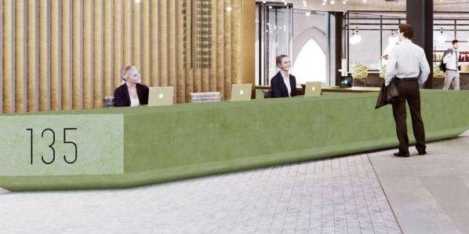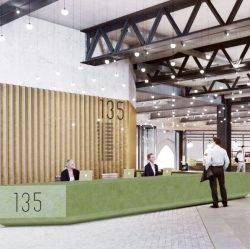November 27, 2018
Three out of four UK SMEs failing to embrace digital workplace
 IT analyst Gartner has forecasted that by 2022 cloud will make up almost a third of IT spending, but only a quarter of SMEs are properly prepared for it, claims a new study. The Missed Middle study, commissioned by Crown Workspace, found that three quarters of UK SMEs are failing to embrace workplace technologies such as cloud, mobile working and digital devices. This could impact their business agility, security and financial efficiency. Cost is the most common barrier preventing SMEs from creating the optimum workspace that features modern technology. For instance voice technology has seen huge adoption over the past few years, however less than one in five respondents are ready for it in the workplace. (more…)
IT analyst Gartner has forecasted that by 2022 cloud will make up almost a third of IT spending, but only a quarter of SMEs are properly prepared for it, claims a new study. The Missed Middle study, commissioned by Crown Workspace, found that three quarters of UK SMEs are failing to embrace workplace technologies such as cloud, mobile working and digital devices. This could impact their business agility, security and financial efficiency. Cost is the most common barrier preventing SMEs from creating the optimum workspace that features modern technology. For instance voice technology has seen huge adoption over the past few years, however less than one in five respondents are ready for it in the workplace. (more…)









 Take-up of office space in Central London has shown a year-on-year increase of 30 percent, reaching 1.3m sq ft in October, according to CBRE. Take-up was strong from creative firms, representing 18 percent of all deals, including the largest deal of the month which saw McCann Erickson take 146,400 sq ft at 135 Bishopsgate EC2. Flexible office operators took 122,300 sq ft of space during the month, bringing the proportion of take-up represented by the flexible office sector in the last 12 months to 19 percent. The largest flex acquisition in October saw Landmark Spaces acquire 37,800 sq ft at Portman House in the West End.
Take-up of office space in Central London has shown a year-on-year increase of 30 percent, reaching 1.3m sq ft in October, according to CBRE. Take-up was strong from creative firms, representing 18 percent of all deals, including the largest deal of the month which saw McCann Erickson take 146,400 sq ft at 135 Bishopsgate EC2. Flexible office operators took 122,300 sq ft of space during the month, bringing the proportion of take-up represented by the flexible office sector in the last 12 months to 19 percent. The largest flex acquisition in October saw Landmark Spaces acquire 37,800 sq ft at Portman House in the West End. 


 The level of demand for UK commercial property remains strong, despite continued lack of clarity over Brexit. According to the latest GVA review of commercial property investment market, European investors were more risk averse to the UK market because of the uncertainty caused by Brexit but demand from overseas investors, particular from China and the Far East, strengthened in 2018. Domestic investors have also made a ‘come-back’ to the UK market and have accounted for approximately 12 percent more acquisitions in 2018, compared to the previous year. In the North East, the lack of availability of investment property is one of the biggest factors affecting growth and there remains strong competition, particularly for prime well let assets. Regardless of political uncertainty, the fundamentals of the UK commercial property market will continue to make it an attractive place to invest, with London remaining the number one priority target of investors outside of Europe. Overall, the report concludes, the UK commercial property market will remain attractive with the exception of retail.
The level of demand for UK commercial property remains strong, despite continued lack of clarity over Brexit. According to the latest GVA review of commercial property investment market, European investors were more risk averse to the UK market because of the uncertainty caused by Brexit but demand from overseas investors, particular from China and the Far East, strengthened in 2018. Domestic investors have also made a ‘come-back’ to the UK market and have accounted for approximately 12 percent more acquisitions in 2018, compared to the previous year. In the North East, the lack of availability of investment property is one of the biggest factors affecting growth and there remains strong competition, particularly for prime well let assets. Regardless of political uncertainty, the fundamentals of the UK commercial property market will continue to make it an attractive place to invest, with London remaining the number one priority target of investors outside of Europe. Overall, the report concludes, the UK commercial property market will remain attractive with the exception of retail.
 The majority (89 percent) of employers say in-building mobile coverage is important to their business, but only 17 percent of businesses have full bar indoor mobile coverage, claims a new report. ‘Building Connections’, commissioned by Vilicom argues that as 78 percent of adults own a smartphone and check it every 12 minutes on average, and with the number of UK landlines falling 35 percent from 10m in 2010 to 6.4m in 2017, a lack of mobile coverage seriously threatens productivity, revenue, damage to reputation and customer satisfaction for organisations of all kinds.
The majority (89 percent) of employers say in-building mobile coverage is important to their business, but only 17 percent of businesses have full bar indoor mobile coverage, claims a new report. ‘Building Connections’, commissioned by Vilicom argues that as 78 percent of adults own a smartphone and check it every 12 minutes on average, and with the number of UK landlines falling 35 percent from 10m in 2010 to 6.4m in 2017, a lack of mobile coverage seriously threatens productivity, revenue, damage to reputation and customer satisfaction for organisations of all kinds.
 Investment in City of London offices is up by 7.6 percent for the same period last year reaching £9.47 billion as of the end of October 2018 – while the West End market is on track to reach at least £7.4 billion before the year is out. This is up on the £7 billion turnover seen in 2017, according to Savills. Stephen Down, executive director and head of Savills Central London investment team, says: “Demand for central London offices has remained buoyant throughout 2018. While we may not see the year set any new records, annual volumes look set to either surpass or draw very close to those of 2017.
Investment in City of London offices is up by 7.6 percent for the same period last year reaching £9.47 billion as of the end of October 2018 – while the West End market is on track to reach at least £7.4 billion before the year is out. This is up on the £7 billion turnover seen in 2017, according to Savills. Stephen Down, executive director and head of Savills Central London investment team, says: “Demand for central London offices has remained buoyant throughout 2018. While we may not see the year set any new records, annual volumes look set to either surpass or draw very close to those of 2017. 


 The vast majority (97 percent) of office workers in UK feel frustrated by their workplace environments, with many feeling the need to escape office life as a result. A new report from Staples has discovered that one-in-five (22 percent) end up browsing LinkedIn job ads for something better when they’re frustrated. As a result, job-hopping is prolific, with workers now predicted to have 11.7 jobs between the ages of 18 and 48. The expectation that the grass must be greener elsewhere is leaving most thinking about switching jobs. However, when they do end up jumping ship, many just experience a short-term fix. According to the study, a third (37 percent) get frustrated in their new office before the end of their first six months. The majority of office workers say they seek fulfilment (89 percent) at work, and for most (77 percent), the quality of their office workspace is a contributing factor in how fulfilled they feel.
The vast majority (97 percent) of office workers in UK feel frustrated by their workplace environments, with many feeling the need to escape office life as a result. A new report from Staples has discovered that one-in-five (22 percent) end up browsing LinkedIn job ads for something better when they’re frustrated. As a result, job-hopping is prolific, with workers now predicted to have 11.7 jobs between the ages of 18 and 48. The expectation that the grass must be greener elsewhere is leaving most thinking about switching jobs. However, when they do end up jumping ship, many just experience a short-term fix. According to the study, a third (37 percent) get frustrated in their new office before the end of their first six months. The majority of office workers say they seek fulfilment (89 percent) at work, and for most (77 percent), the quality of their office workspace is a contributing factor in how fulfilled they feel.


 New research suggests as the supposed ‘technologically savvy’ millennials enter the workforce they are more likely than older workers to break the most basic of security rule, reusing passwords across different accounts. This is according to the results of the 10th Annual Market Pulse Survey from SailPoint Technologies Holdings, which finds that despite an increased focus on cybersecurity awareness in the workplace, employees’ poor cybersecurity habits are getting worse, which is compounded by the speed and complexity of the digital transformation.
New research suggests as the supposed ‘technologically savvy’ millennials enter the workforce they are more likely than older workers to break the most basic of security rule, reusing passwords across different accounts. This is according to the results of the 10th Annual Market Pulse Survey from SailPoint Technologies Holdings, which finds that despite an increased focus on cybersecurity awareness in the workplace, employees’ poor cybersecurity habits are getting worse, which is compounded by the speed and complexity of the digital transformation. 
 Over half of home workers say they appreciate the benefits that home working offers but nearly a quarter complain of loneliness too, a new survey from BHSF claims. When asked how working from home makes them feel, the top three responses were: free (50 percent), in control (47 percent) and calm (46 percent). However, a significant number of those surveyed chose more negative words to describe their feelings. Just over a quarter (26 percent) said that working from home made them feel remote, 24 percent felt isolated and 21 percent lonely.
Over half of home workers say they appreciate the benefits that home working offers but nearly a quarter complain of loneliness too, a new survey from BHSF claims. When asked how working from home makes them feel, the top three responses were: free (50 percent), in control (47 percent) and calm (46 percent). However, a significant number of those surveyed chose more negative words to describe their feelings. Just over a quarter (26 percent) said that working from home made them feel remote, 24 percent felt isolated and 21 percent lonely. 








November 19, 2018
A cheap day return to Farringdon, please
by Neil Usher • Comment, Facilities management
(more…)